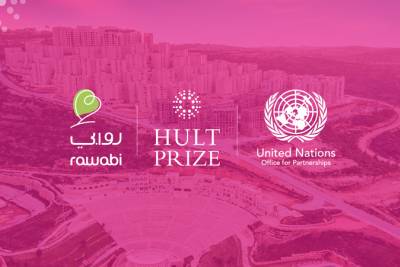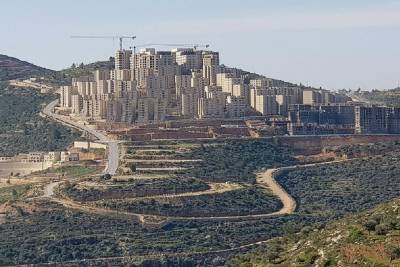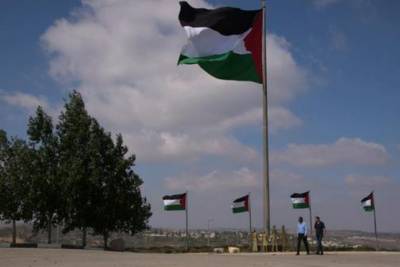PALESTINE’S FIRST GREEN CITY—RAWABI
Global Mayors Forum - Rawabi developers are making every effort to build Rawabi as a green home for Palestinians. The master plan applies environmentally responsible landscape and development practices that will preserve the natural features of the landscape. Meanwhile, at Rawabi, the protection of environment, the safety and well-being of Palestinians all are paramount. Now, Rawabi has taken the lead on this issue. This passage just introduces the recycling and wastewater management carried out in Rawabi. The vision is for Rawabi to serve as a prototype of the first Palestinian green city and ultimately, to guarantee a higher quality of life for present and future generations.
Creating sustainable and environmentally friendly practices at every stage of the construction life cycle at Rawabi is integral to the values of the new community.
Worldwide, well-defined ecological, environmental, social responsibility and human health metrics exists that assist developers in their efforts to maintain clean operations that pose no threat to the environment or to humans who live close to construction sites. The potential for pollution or the misuse of resources is always present; it is easier and cheaper to be a polluter than it is to be a friend of the environment.
At Rawabi, the protection of environment and the safety and well-being of Palestinians is paramount. Rawabi has taken the lead on this issue; hoping to set what will be a very high standard of sustainable practices for contractors and builders throughout Palestine and serving as a model for future development.
Recycling In Rawabi
Water Recycling in the Stone-Cutting Factory
Currently, Rawabi mobilizes the water it needs in its stone-cutting factory and stores it in water silos specially constructed for this purpose.
Stone-cutting is a water intensive process. Water is used to control dust, to cut, wash and polish stone surfaces and to cool high-heat machine grinders in the stone-cutting operation. A stone-cutting factory like Rawabi's, which operates around the clock, would consume 10,360 liters of water per day. Recycle and reuse is the only way to avoid unnecessary water consumption of water. Rawabi’s water recycling system reduces the level of water consumption to less than 10% of the quantity required without reuse. Water comes out of the stone factory and flows into a special collecting system. Used water, which is contaminated with stone dust, cannot be permitted to seep into the soil where it would cause damage to groundwater, aquifers and the water table.
Instead all the wastewater byproducts are run through a special filtration and compression system which removes the stone dust and large particles from the water. The cleaned water is returned to the factory for reuse in a continuous closed loop.
Stone Recycling
As precise as Rawabi’s stone cutting machinery is, there is always some residual stone left over from the cutting process.
Rawabi’s developers are building the city with the same stone quarried from Rawabi hills, which allows them to use the surplus pebble-sized pieces are used to cover Rawabi’s road retaining walls. Smaller particles not suited for this purpose are sent to the Rawabi “crusher” which pulverizes the rock into aggregate that varies in size and is used to create concrete.
The words “cement” and “concrete” are often used interchangeably, but cement is actually an ingredient in concrete. Rawabi creates its own concrete by reusing the aggregate byproduct of its stone cutting factory and mixing it with water, cement, sand and other additives.
Steel Recycling
One of the most expensive and important components of construction is the steel used to reinforce building structures. The city will use thousands of tons of steel throughout the lifespan of the project, so careful accounting of this expensive building resource is required.
Each shipment of steel is brought in for a specific purpose. Construction workers trained specially in the handling, cutting and bending of steel take great care to use precise measurements to minimize errors and waste. Small leftover pieces of steel are gathered up and sent back to steel factories to be melted back down to liquid form and reused in another larger rod or sheet.
Wastewater Management In Rawabi
The Arab region is believed to be one of the driest in the world- 70% of the land is dry and rainfall is sparse and the effects of climate change will only exacerbate the situation. The planners behind Palestine’s first green city Rawabi have recently given the go-ahead for a feasibility study for a new regional wastewater facility which strengthens their commitment preserving water.
Despite initial reservations about the projects lack of solid waste and wastewater management, the recent announcement has gone someway toward alleviating environmentalists’ concerns. The feasibility study will help plan for a wastewater treatment plant for the city and will also be “instrumental in identifying permanent solutions for the treatment of wastewater in a regional context.
Improving Water Conservation Facilities
Wastewater is complex issue in Palestine due to the Israeli-Palestine conflict which hinders effective co-operation between the two nations. Inadequate waste water treatment plants in the Palestinian territoriesmeans that only 22.5 million cubic metres out of around 150 million cubic metres of raw sewage created every year is adequately treated to make it safe for reuse. Most of the raw sewage is contained in septic tanks- some of which are not adequately enforced which can lead to the contamination of Palestinian and Israeli ground water supplies.
Bashar Masri, Managing Director of Bayti Real Estate Investment Company behind the Rawabi project stated, “Palestine’s particular political and economic situation has weakend the already fragile environment. Rawabi’s goal is to reverse that decline by nurturing the environment
through responsible management, which includes re-planting Palestine’s vanishing tree resources, using non-reclaimable materials wisely, and doing everything within our means to conserve water.
Growing Trees
Rawabi has also launched a GROW for a Greener Palestine initiative which is working to plant trees and encourage young Palestinians’ to embrace nature by working with environmental experts to plant trees.
The project is also teaching the youth about the value of trees due to their ability to stop soil erosion, conserve Palestine’s scarce water resources and encourage rainfall.
Together the two projects can play an important role in establishing Rawabi as an example of a green and sustainable city to be emulated in the whole of Palestine.
To view original article, Click Here.



